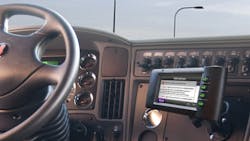The trucking industry has yet to feel the full impact of the electronic logging device (ELD) mandate, according to analysis recently conducted by research firm FTR Transportation Intelligence. And with full enforcement of the rule still expected to occur starting April 1 this year, it’s galvanizing the efforts of a number of groups – notably the Owner Operator Independent Driver Association (OOIDA) – to try and roll back or at least minimize the ELD mandate’s reach.
According to Avery Vise, FTR’s vice president of trucking research, the mandate itself is still a “moving target in many ways,” meaning uncertainties surrounding exemptions, enforcement, and motor carrier insurance premiums continue to linger.
During FTR’s State of Freight: ELD Implementation Impacts webinar this week, Vise reiterated that violations for failure to have electronic hours of service (HOS) logs won’t go into effect until April 1. And when it comes to the private sector, he noted shippers and brokers in most cases will not single out ELD compliance as opposed to general HOS compliance under the Federal Motor Carrier Safety Administration (FMCSA).
“Most contracts between carriers and the people who give them freight require that they certify they are going to follow the regulations,” he explained. “And most people in the shipping industry have decided it’s neither wise nor necessary to single out ELDs.”
In addition, insurers for the small carriers are not likely to ensure they comply with the mandate, either. But that won’t necessarily be the case for larger carriers.
“We expect there might be some more aggressive involvement in loss control as it comes into play with larger carriers, but for small carriers, there just aren’t the resources to do that,” Vise said. “Their insurance premiums are pretty high to cover that risk, so they will of course have to certify compliance with the hours of service regulations, but there won’t be much involvement by their insurers in ensuring that they actually comply.”
Clay Slaughter, senior analyst at FTR, pointed out that insurers are going to want to see some hard proof that larger carriers are complying with applicable laws as part of their loss-control processes.
“The insurer is going to build into the premium an expectation that some people aren’t going to comply and then they’ll have to reevaluate whether or not they’ll continue to use them as a client,” he said. “Obviously any carrier that’s going to have multiple violations is going to see a change in that insurance premium, or they’re no longer going to be covered.”
Even though the mandate has been in effect for about two months now, Vise noted there is still a substantial portion of the nation where there is either no enforcement going on, or there is” inconsistent or spotty enforcement.”
States are capturing violation data though it doesn’t yet count against Compliance, Safety, Accountability of CSA scores, Vise said, and they do so by using a particular code: 39522A. However, based on FTR’s research of public uploads over the last two months, that violation code does not appear in the data.
“That’s not such a big deal necessarily, except that we are seeing there has been an increase in two classes of violations: One is the 3958A, which is basically the driver didn’t have logs, or the 39515 violation, which is basically the existing AOBRD [automatic onboard recording device] standard,” Vise said, noting both violations have increased, but not necessarily in large numbers.
“The important thing here is that these do have severity weights assigned to them,” he added. “If an inspector is giving a carrier one of these violations, that’s actually going to affect their CSA scores. It’s something that FMCSA is on record, in writing, saying, ‘This should not affect CSA scores.’”
Vise said carriers who have been logged as a 3958A violation when they should have been logged as a 39522A violation, will have to file a DataQs challenge so it doesn’t impact their CSA scores.
Efforts to limit the mandate’s impact on smaller trucking operators continue apace as well. The OOIDA filed an exemption request with the FMCSA for small trucking businesses that earn less than $27.5 million in annual revenue and that do not have an unsatisfactory safety rating, which Vise said comprises virtually all carriers.
“If you have an unsatisfactory safety rating that you do not correct, you’re out of business,” he pointed out. “So that’s sort of a throwaway … I think clearly OOIDA has in mind something that is more favorable to the carrier perhaps than what we see in the crash-preventability program that we have in place now.”
More than 4,000 comments have been filed regarding this exemption, which the American Trucking Assns. (ATA), safety advocate groups, and various individual large carriers have opposed.
“My personal feeling is it’s not likely to succeed, but there is some chance that this could succeed, so we’ll have to watch,” Vise noted.
If OOIDA’s petition succeeds, it could have far-reaching effect, according to FTR data, as 93% of one-truck over-the-road (OTR) companies had no DOT-recordable crashes in the past two years, with 81% of all OTR trucking companies having no DOT-recordable crashes in the past two years. If this exemption does succeed, in theory, then, a vast majority of the industry would not have to comply with the mandate, FTR pointed out.
“It’s not like this hasn’t been raised before,” Vise contended. “But it will be an interesting battle and certainly it’s not inconceivable that we could see it crop up in Congress as part of a funding bill down the road.”
About the Author

Cristina Commendatore
Cristina Commendatore is a past FleetOwner editor-in-chief. She wrote for the publication from 2015 to 2023.
